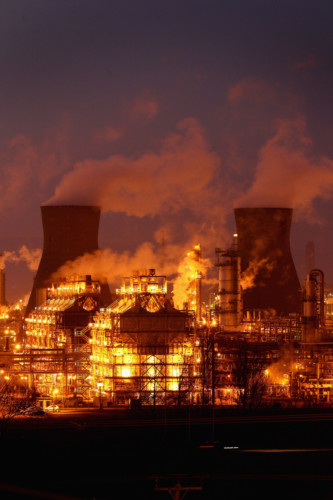Swiss petrochemicals giant INEOS hailed shale gas as the future of British manufacturing yesterday as it secured exploration licences over huge swathes of the UK.
The group has been offered 21 new options covering a landmass of around 700,000 acres in the UK’s latest onshore oil and gas licensing round.
The firm emerged as the big winner as the UK Government handed out 93 licences relating to locations across mid-England and in Wales. No Scottish licences were available in the process.
However, the awards will dismay environmental campaigners who are against the extraction of shale gas through the controversial method of fracking in the UK.
INEOS chairman Jim Ratcliffe, a controversial figure who once threatened to close down Scotland’s vital Grangemouth petrochemicals facility following a bitter industrial dispute, said he was delighted at the outcome.
“The UK Government has demonstrated it is determined to move forward with this exciting new industry,” Mr Ratcliffe said.
“This is the start of a shale gas revolution that will transform manufacturing in the UK.
“INEOS has the skills to safely extract the gas and we have already committed to both fully consult and to share the rewards with the local communities.”
INEOS’s existing shale portfolio covers around 300,000 acres of the UK, including a series of licences extending out from Grangemouth across much of the Forth Valley.
In the summer, INEOS topped out a massive new ethane storage tank at Grangemouth to hold imported feedstocks from the US.
The firm’s long-term vision is to use the facility to hold indigenous shale reserves which it could use both as feedstock for other petrochemicals processes and as a direct source of power production.
However, its ambitions to exploit shale north of the border have been put on hold by a moratorium introduced by the Scottish Government on unconventional oil and gas exploration.
Andy Samuel, chief executive of the UK Oil & Gas Authority regulatory body, said the licence awards would allow significant research to be carried out into the UK’s shale gas potential.
While a licence grants a company exclusivity over an area of land for exploration, appraisal and extraction, it does not in itself give direct permission for operations to begin as specific planning permissions and other consents must also be in place.
“Upon acceptance of these offers, applicants will be issued with licences and will be able to begin planning their future strategies for exploration activities,” Mr Samuel said.
“These will be subject to further local planning, safety, environmental and other authorisations.”
UK Energy Minister Andrea Leadsom added: “Alongside conventional drilling sites, we need to get shale gas moving.
“As the Task Force for Shale Gas report found earlier this week, with the right standards in place fracking can take place safely.
“Now is the time to press ahead and get exploration under way so that we can determine how much shale gas there is and how much we can use.”
